Major Power Relations
Your Present Location: PROGRAMS> Major Power Relations-
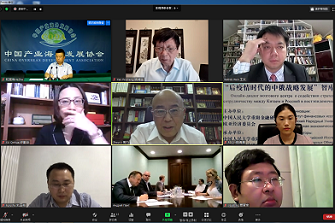
China-Russia Think Tank Online Dialogue: treating and caring for hard-won public opinion in both countries
Think Tank Online Dialogue on China-Russia Strategic Cooperation in the Post-epidemic Era was held in Beijing and Moscow simultaneously on July 13, 2020, sponsored by Chongyang Institute for Financial Studies, Renmin University of China (RDCY) and Eurasian Economic Commission (EEC), and organized by the Sino-Russia People-to-people Exchange Research Center, Renmin University of China (operated by RDCY). Government officials, scholars, and well-known enterprise's representatives in China and Russia discussed on current public opinion environment facing China and Russia, China-Russia strategic cooperation in the post-epidemic era and outlook for the China-Russia think tank dialogue.
2020-07-15 -
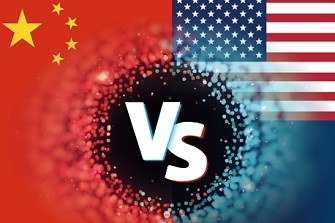
Beijing announces targeted countermeasures against anti-China US hawks
As Washington has now descended into a "morbid and bottomless" struggle to contain a rising China, Chinese observers noted that the targeted sanctions China announced signals Beijing is fully prepared for the further floundering of China-US ties; and although China hopes for the best that bilateral ties will evolve, China is still preparing for the worst to come.
2020-07-14 -

Wang Wen: China instills certainty into a chaotic world
Chinese State Councilor and Foreign Minister Wang Yi delivered a speech to the China-US Think Tanks Media Forum on Thursday. As one of the organizers of the event, I attended the forum and was impressed by the huge amount of information he made in his remarks. Regrettably, US media outlets failed to adequately report about this most systematic explanation of China's US policy by Chinese policymakers since the deterioration of Beijing-Washington relations. I would therefore like to share my understanding of the speech to the English-speaking world through this column.
2020-07-14 -

China-US pandemic assistance persists despite rational voices receding
Key advocates are calling for greater partnering between China and the US in the fight against coronavirus even as rational voices are being marginalized and undervalued especially during the COVID-19 outbreak in the US, where some politicians have politicized the virus by tossing wild accusations against China. While many people in the US and China have forged close relationships, they constantly face challenges from US political hawks whose China-bashing rhetoric intimidates progressives and stunts local cooperation and support.
2020-07-10 -
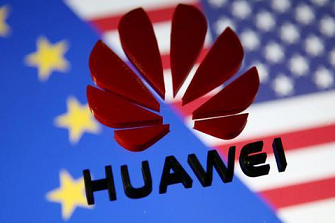
Wang Yiwei: Independent view of Huawei crucial for European interests
The US, under the guise of national security concerns, has been relentlessly cracking down on Huawei and has placed enormous pressure on its European allies to stay away from the leading 5G tech firm. It is attempting to buy time to catch up in the 5G race, at the cost of its allies' interests. However, a balanced strategy and cooperation are now crucial for the EU to recover from the pandemic and gain an advantage in the digital revolution era.
2020-07-10 -
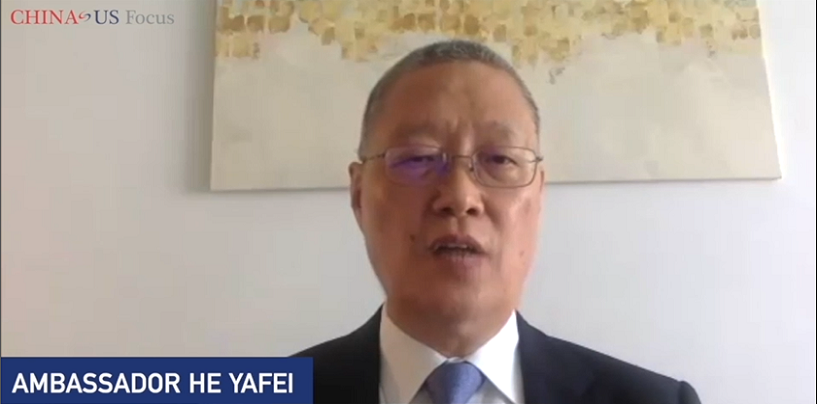
He Yafei: Talk More, Not Less |The Pacific Dialogue | Part 3
The Pacific Dialogue is a new way to virtually connect thought leaders across the Pacific Ocean to continue frank and direct conversations during this difficult time. This is part 3 of episode two of The Pacific Dialogue, between veteran Chinese diplomat Ambassador He Yafei and long-time American scholar on China Professor David Lampton.
2020-07-09 -
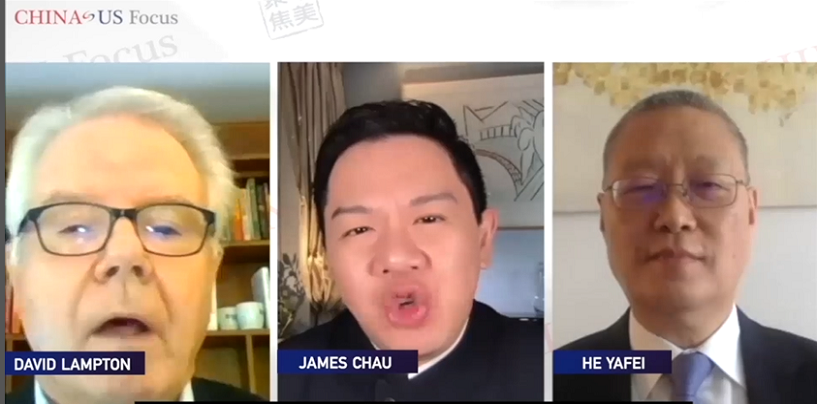
He Yafei: Talk More, Not Less |The Pacific Dialogue | Part 2
The Pacific Dialogue is a new way to virtually connect thought leaders across the Pacific Ocean to continue frank and direct conversations during this difficult time. This is part 2 of episode two of The Pacific Dialogue, between veteran Chinese diplomat Ambassador He Yafei and long-time American scholar on China Professor David Lampton.
2020-07-09 -
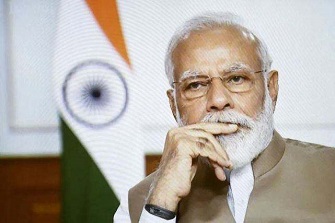
India keeps itself away from East Asian value chain as it refuses to join RCEP
India is distancing itself from the value chain of the East Asian Economy, and it always wants to pay in little but want too much out of joining international organizations such as the Regional Comprehensive Economic Partnership (RCEP). The comment came after The Print said India has decided it won't join any trade deal that has China as a member, citing Indian official sources. The border standoff and Indian government's ban on 59 apps developed by Chinese companies have added tensions to the China-India relationship.
2020-07-09 -

He Yafei: Talk More, Not Less |The Pacific Dialogue | Part 1
The Pacific Dialogue is a new way to virtually connect thought leaders across the Pacific Ocean to continue frank and direct conversations during this difficult time. This is part 1 of episode two of The Pacific Dialogue, between veteran Chinese diplomat Ambassador He Yafei and long-time American scholar on China Professor David Lampton.
2020-07-08 -
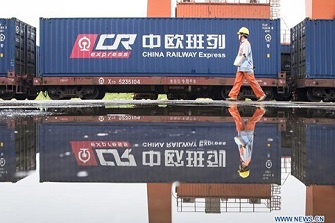
Liu Zhiqin: Has Europe been naive about its foreign policy toward China for 40 years?
Certain European politicians and scholars have been repeatedly using the word "naive" to describe Europe's foreign policies toward China, defining China as a "systemic rival" and claiming that the EU's naive era is over. Such a notion also reveals a trace of helplessness, self-pity and even frustration over its ignorance, with the words between the lines reading Europe's judgment on China has been wrong.
2020-07-06 -
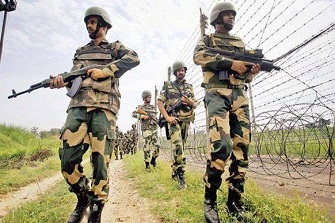
Liu Zongyi: Why did the bloody Galwan clash taken place?
The Galwan Valley border clash was an unfortunate incident. Liu Zongyi, secretary-general of the South Asia and China Center of the Shanghai Institutes for International Studies, argues that a repeat is inevitable if Delhi cannot shake off the specter of Nehru, originator of the “offensive defense” border policy, and reconsider its relations with Beijing.
2020-07-03 -
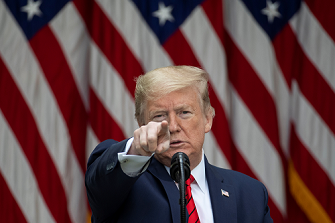
Zhao Minghao: Washington's 'narrative warfare' on Beijing
In their latest move, U.S. National Security Adviser Robert O'Brien, and Secretary of State Mike Pompeo attacked China's domestic and foreign policies as well as its political system in harsh, unmerited rhetoric. In the coming weeks, U.S. Attorney General William Barr and several senior Trump administration officials, are also expected to deliver tough speeches on China, to highlight the so-called "China threat" in trade, technology and ideology.
2020-06-30 -
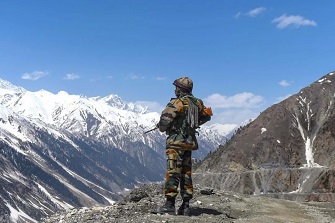
Lin Minwang: India lifting arms rules at border endangers its own security
India has reportedly reset the rules of engagement with Chinese troops along the China-India border. The Indian Army gave their troops "complete freedom of action" to handle situations. More specifically, they are permitted to do this with "any aggression by China" at the tactical level. Field commanders will also be allowed to use firearms in "extraordinary" circumstances on the Line of Actual Control, according to Indian media reports.
2020-06-29 -
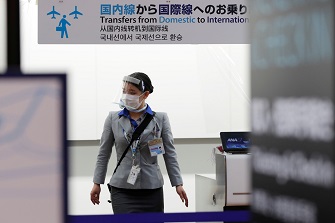
Pandemic has changed regional dynamics
He Yafei, a former Chinese viceminister of foreign affairs, outlined several key points that should be put on top of the security threat list for the Asia-Pacific region. Any possible deterioration of tension among major powers needs to be prevented because it could lead to military confrontation, he said, suggesting that crisis management or dialogue within a consultation mechanism to deal with crises has to be put in place.
2020-06-29 -
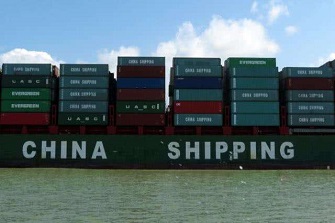
India ‘holds' Chinese goods from clearance, to backfire and hurt global industrial chains
India is reportedly putting some containers from China on hold during clearance for all-round inspection and scrutiny amid the recent stand-off between the two nations, following a fatal border clash. It is a stupid choice which will backfire and hurt global industrial chains, a Chinese expert said.The latest commander-level bilateral talks have eased tensions between the two countries, and India, after a deadly provocation, realized it was not wise for the country, Long said. He thinks the scenario will not last long due to India’s huge economic costs
2020-06-28 -
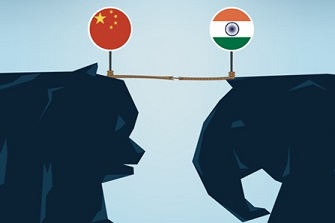
Long Xingchun: Time to cool down Indian nationalism
Commander-level talks between Chinese and Indian border troops were held on Monday. It was the first such meeting following the Galwan Valley deadly brawl on June 15. The dialogue is significant as the two sides are able to understand each other's bottom line better, amid the border tensions. The last round of bilateral commander-level talks was held on June 6. By then, both sides agreed to avoid escalating their disputes, to work together to uphold peace and tranquility along the border, and to create a favorable atmosphere for the sound and stable development of bilateral relations. Reports show both China and India agreed to disengage their troops in sensitive areas.
2020-06-28 -
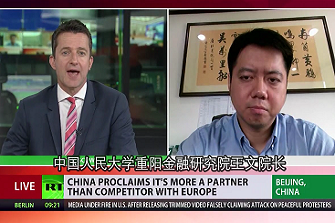
Wang Wen: The conspiracy of the United States and Europe to engage in a cold war against China has been broken
Both China and EU do appear to be keen to make progress. Wang Wen, the Executive Dean of Chongyang Institute for Financial Studies at Renmin University of China (RDCY), interviewed by Russia's top international media "Russia Today" (RT) and shared his opinions on the chances of a major breakthrough. The following is the full text of the interview.
2020-06-24 -
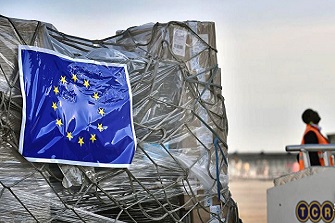
EU advised to refrain from 'politically correct' values for China ties
The Europe and China attached greater importance to pragmatic cooperation, despite some Western media described that the EU-China summit on Monday concluded with more differences than consensus. Chinese observers on EU affairs pointed out that EU defending their so-called values by bringing up a number of issues such as Hong Kong, Xinjiang and human rights could be interpreted as building a "spiritual fortress" in the face of China's growing influence.
2020-06-24 -
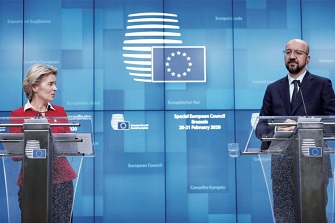
China, EU seeks to inject momentum in recovery
The 22nd EU-China summit took place on Monday via videoconference during which Chinese President Xi Jinping and Premier Li Keqiang met with Charles Michel, President of the European Council, as well as Ursula von der Leyen, President of the European Commission. Issues addressed at this virtual meeting included cooperation on the COVID-19 response, China-US relations, and other global and regional issues.
2020-06-23 -
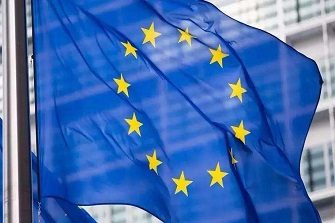
Djoomart Otorbaev: What can the EU do to mitigate the risk of China-U.S. conflicts?
The battles between Beijing and Washington have so far emerged on almost everything – technology, trade, investment, supply chains, journalists, responses to demonstrations, COVID-19, etc. Who, if any, can cool down this situation? Perhaps, other influential "global players" can play a role? But who are those "global players"? Russia now will not be able to mediate since it is openly not on the same side with the U.S. Thus, I would like to look into relationships within the U.S.-EU-China triangle.
2020-06-22
























































































 京公网安备 11010802037854号
京公网安备 11010802037854号





